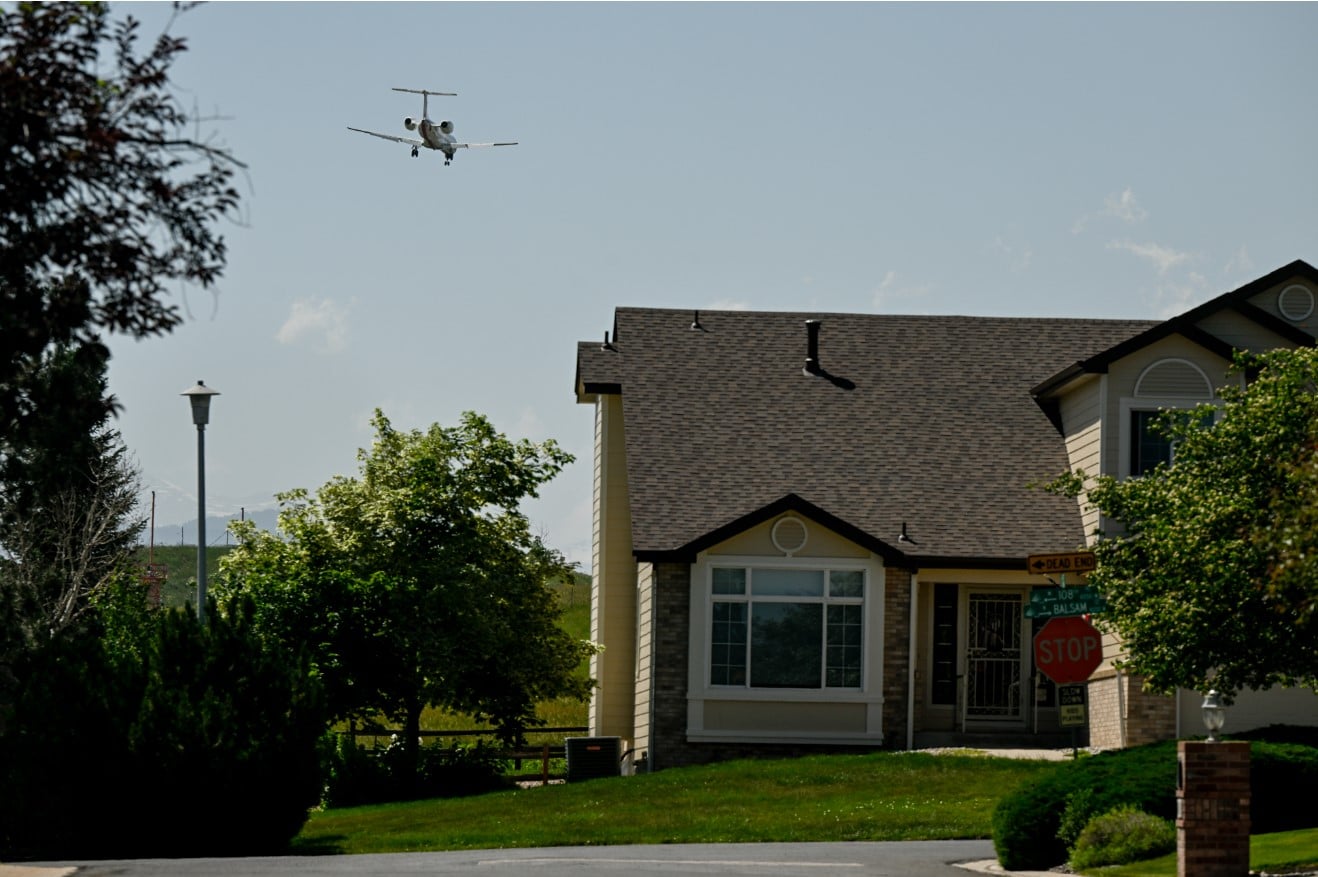
An airplane passes over a neighborhood in Westminster on its way to Rocky Mountain Metropolitan Airport on Monday, June 26, 2023. (Photo by AAron Ontiveroz/The Denver Post)
Four hundred and six homeowners in Superior are suing Jefferson County, accusing its airport of violating their airspace, dumping lead on them and devaluing their 230 houses.
Their lawsuit, filed Dec. 21 in Boulder, marks an escalation in a years-old dispute between Rocky Mountain Metropolitan Airport and residents of the Rock Creek neighborhood, which is located just northwest of the airport in Boulder County.
The airport has surged in popularity in recent years, with 300,000 takeoffs and landings in 2022, or one every two minutes, and likely even more in 2023. That means thousands of jobs and hundreds of millions of dollars in business revenue, according to Jefferson County.
It also means noise, pollution and lower home values for its neighbors to the northwest.
“Properties offered for sale have been sitting on the market for longer than other similar properties; some potential buyers have not moved forward after visiting properties; and some properties have been sold below market value,” last week’s lawsuit claimed.
In 2020, the Rock Creek Homeowners’ Association sued Jefferson County, claiming that the airport’s uptick in traffic had overburdened the airport’s 29 avigation easements — its rights to fly over the neighborhood — and therefore all easements should be erased.
After a two-day trial, District Court Judge Stephen Howard eliminated nine of the easements in 2021, narrowing the airspace that RMMA can use. Both sides unsuccessfully challenged that ruling to the Colorado Court of Appeals, which affirmed Howard’s order this year.
Residents then urged the Town of Superior to sue Jefferson County. It didn’t, so they did.
In last week’s lawsuit, homeowners accuse the county of ignoring Howard’s order and operating “as though the terminated easements were still in full legal force and effect.”
“In fact, the county has significantly increased the amount and intensity of its airport operations ever since the prior easements were terminated, including using the airport for flight school training flights…at all hours of the day and night,” the airport’s neighbors allege.

Matthew Cape, captain of the MSU Denver precision flight team, heads toward the runway at Rocky Mountain Metropolitan Airport on Sept. 25, 2019. (Photo by Joe Amon/The Denver Post)
RMMA has vowed to switch from leaded gasoline to unleaded by 2027 but in the meantime, elevated levels of lead have been found in the Rock Creek area. The lawsuit said that “many homeowners have avoided spending time outdoors” as a result of falling lead.
A spokeswoman for Jefferson County said that she was unable to get a response to the lawsuit from county officials before press time due to the Christmas holiday.
Thursday’s lawsuit is what’s known as an inverse condemnation case. It operates as eminent domain in reverse. Rather than the government suing to take property and reimburse its owners, property owners sue the government, alleging they are owed reimbursement.
“Airport operations constitute the taking and damaging of homeowners’ constitutionally protected property rights, which requires the payment of just compensation,” they say.
The homeowners don’t spell out a dollar amount that they believe they are owed by Jefferson County, leaving that to Judge Robert Gunning to determine, but say the county should also pay interest on that compensation, plus the homeowners’ attorney fees and court costs.
They are represented by lawyers John Sperber, Sean Metherell and Rebecca Smith with the Denver office of Faegre Drinker Biddle & Reath, a national law firm.
